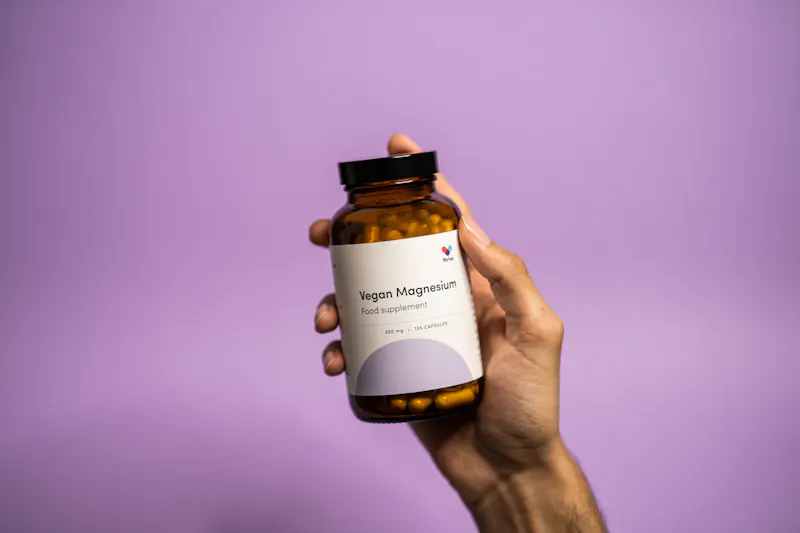What to watch out for in supplements
What's covered?


When you pick a supplement, most of us focus on the ‘active ingredients’ — the parts which give us the vitamins and minerals we need. But have you ever noticed the long list of other ingredients on the label? It’s important to know what these other ingredients are and which ones to look out for.
Fillers in supplements
Lots of the nutrients you need are really tiny, called micronutrients. And because you only need them in such small amounts, they mightn’t fill the capsule or tablet. In fact, some capsules would look pretty much empty.
To overcome this, fillers might be used. Fillers might also be called dilutants or carriers. These make up the desired size of the capsule or tablet. Some common fillers include:
- calcium
- salt
- sugar
- lactose
- rice flour
Our premium supplements are free from artificial colourings, non-GMO, made in the UK, vegan, and easy to absorb.
Binders in supplements
Binders are used to hold the ingredients in a supplement together. Without them, tablets might fall apart. They’re most commonly found in compressed tablets.
Common binders are sugar derivatives. Sometimes cellulose, an insoluble fibre found in plant walls, is used.
Coatings in supplements
Coatings are sometimes used to make supplements easier for people to swallow — for example, capsules. Often coatings are made from gelatin, an animal-based product. So if you’re vegan or vegetarian make sure to read the ingredients. Vegetable-based cellulose capsules are an excellent vegan coating.
Colourings and flavourings in supplements
Some (often cheaper) supplements will use colourings or flavourings in their supplements. These could be natural colourings and flavourings which is preferable. Look out for artificial colourings and flavourings in your supplements.
Flow agents
The majority of supplements are made by machines or for semi-automated purposes, which can involve running finely powdered ingredients through these machines.
Fully automated tablet production processes usually use some form of lubrication for the process to run smoothly. One of the most commonly used lubricants is magnesium stearate. This is one of the baddies to look out for — it can block the absorption of key vitamins and minerals.
Also, watch out for magnesium silicate (aka talcum or baby powder). This can be used as a bulking agent but has been linked to poor health.
Bioavailability of supplements
Bioavailability essentially means the amount of a nutrient you take that ends up being available for your body to use. So when you take in a certain amount of a nutrient (from either your diet or a supplement), it doesn’t mean that all of it will be absorbed into your blood.
Lots of things influence how much of a nutrient your body can absorb and use, including:
- Form: some forms of a nutrient are easier for your body to absorb than others — for example, magnesium citrate is easier to absorb and has better bioavailability than magnesium oxide
- Presence of other nutrients: the nutrients in your supplement might interact with each other — for example, vitamin D helps your body to absorb calcium while iron inhibits zinc absorption. So it’s important to read the label.
- Things in your diet: some substances can interfere with how your body uses nutrients — for example, oxalates in tea can inhibit iron absorption.
- Your age, sex, health, and baseline nutrient level: these all affect how much of a nutrient you absorb — for example, if you’re pregnant your body starts to absorb more calcium and iron.
If you aren’t sure about anything, just ask! It’s always worth checking that you’re buying the most easily absorbed form and that you know what to take your supplements with (and what not to!). Any good quality supplement provider will be able to answer your questions.
Doses of supplements
There’s no hard and fast rule about what dose of a supplement you should take. But it’s a good idea to look at the UK recommended daily allowances (RDAs) as a reference. Most supplement labels state the RDA % so try to find one that has a high proportion of what’s recommended.
With many supplements, it’s hard to overdose as your body will simply get rid of anything extra. But there are some exceptions. If you’re unsure about the dose you need to take you should always consult your doctor.
Choosing the right supplement: tips and tricks
The Food Standards Agency in Europe has strict regulations on what can be included in food supplements. Regulations in the US tend to be less strict. Find more information about how supplements are regulated.
There are still a few tricks to help you buy the highest quality supplements though:
- read the label — check which ones are non-GMO, free from allergens, and vegetarian or vegan. To get these certificates the supplement has been put through a rigorous testing process so it’s unlikely to contain any harmful additives
- avoid things with ‘propyl’ or ‘ethyl’ in the ingredients — these often relate to synthesized (artificially made) additives and should be avoided
- check the dose — try to make sure you’re getting what you need by checking the RDA
- count the ingredients — fewer ingredients means it’s less likely to have lots of additives
- pick pure forms — capsules, liquids, and bulk powders tend to have fewer unwanted additives than tablets
Keep in mind that some additives are necessary to make the nutrients bind together and form. Do your research on ingredients you're not sure about or try to find ones that use words you know, like rice flour.
Shop all our premium supplements.
National Health Services (2016). Common health questions: Do I need vitamin supplements? Retrieved 4 February 2019 from https://www.nhs.uk/common-health-questions/food-and-diet/do-i-need-vitamin-supplements/.
National Institue of Health (2011). Health Information: Dietary supplements: What you need to know. Retrieved 4 February 2019 from https://ods.od.nih.gov/HealthInformation/DS_WhatYouNeedToKnow.aspx.